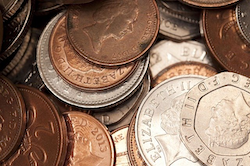Or search by topic
Number and algebra
Geometry and measure
Probability and statistics
Working mathematically
Advanced mathematics
For younger learners
Five More Coins



- Problem
- Teachers' Resources
Five More Coins
This problem follows on from Five Coins so we would recommend looking at that one first.
 Ben has five coins in his pocket.
Ben has five coins in his pocket.
How much money might he have? If possible, talk to someone else about your ideas.
Can you name an amount of money that Ben's five coins couldn't add up to? Why couldn't he have that amount of money?
Dayna is trying to guess how much money Ben has. She knows that altogether he has less than £1.
Dayna starts writing down all the amounts of money less than £1 that Ben's five coins could add up to.
Could Ben have any amount of money between 5p and £1 in his pocket, or do you think there are some amounts that would be impossible for him to have?
Have a go at writing out Dayna's list of numbers, showing how Ben could make each total with five coins. If there are any numbers missing from the list, can you explain why these amounts are impossible for Ben to have?
Why do this problem?
This activity is an interesting context in which to practise addition and subtraction, and it helps learners to become more familiar with coin denominations. It requires a systematic approach and recording is key.
Possible approach
This task follows on from Five Coins, and so it would be worth having a go at that problem before tackling this one.
Introduce the first part of the problem, with Ben having five coins in his pocket. Give them a few minutes to talk to a partner about how much money Ben might have, and then ask some children to share their thoughts. Start to write up their suggestions on the board, for example by listing the five coins and the total. (You may wish to list all the different coins for reference.)
Challenge learners to suggest an amount of money that they think would be impossible to make from five coins, and importantly, why that total is impossible. For example, some pairs might offer a total that is less than 5p, or more than £10; some might suggest an amount which includes a fraction of a penny, such as 20.5p. (You may wish to explain that there used to be a halfpenny coin, but it was removed from circulation at the end of 1984.)
Key questions
If you can't find a way of making a particular total, are you certain you have tried all possibilities? Or is this total impossible? How do you know?
Possible support
Five Coins is a good problem to try before this one. Having coins at the ready will be helpful for many pupils.
Possible extension
Encouarge learners to tweak the task themselves by asking "I wonder what will happen if we...?"
You may also like
Prompt Cards
These two group activities use mathematical reasoning - one is numerical, one geometric.
Consecutive Numbers
An investigation involving adding and subtracting sets of consecutive numbers. Lots to find out, lots to explore.
Exploring Wild & Wonderful Number Patterns
EWWNP means Exploring Wild and Wonderful Number Patterns Created by Yourself! Investigate what happens if we create number patterns using some simple rules.

